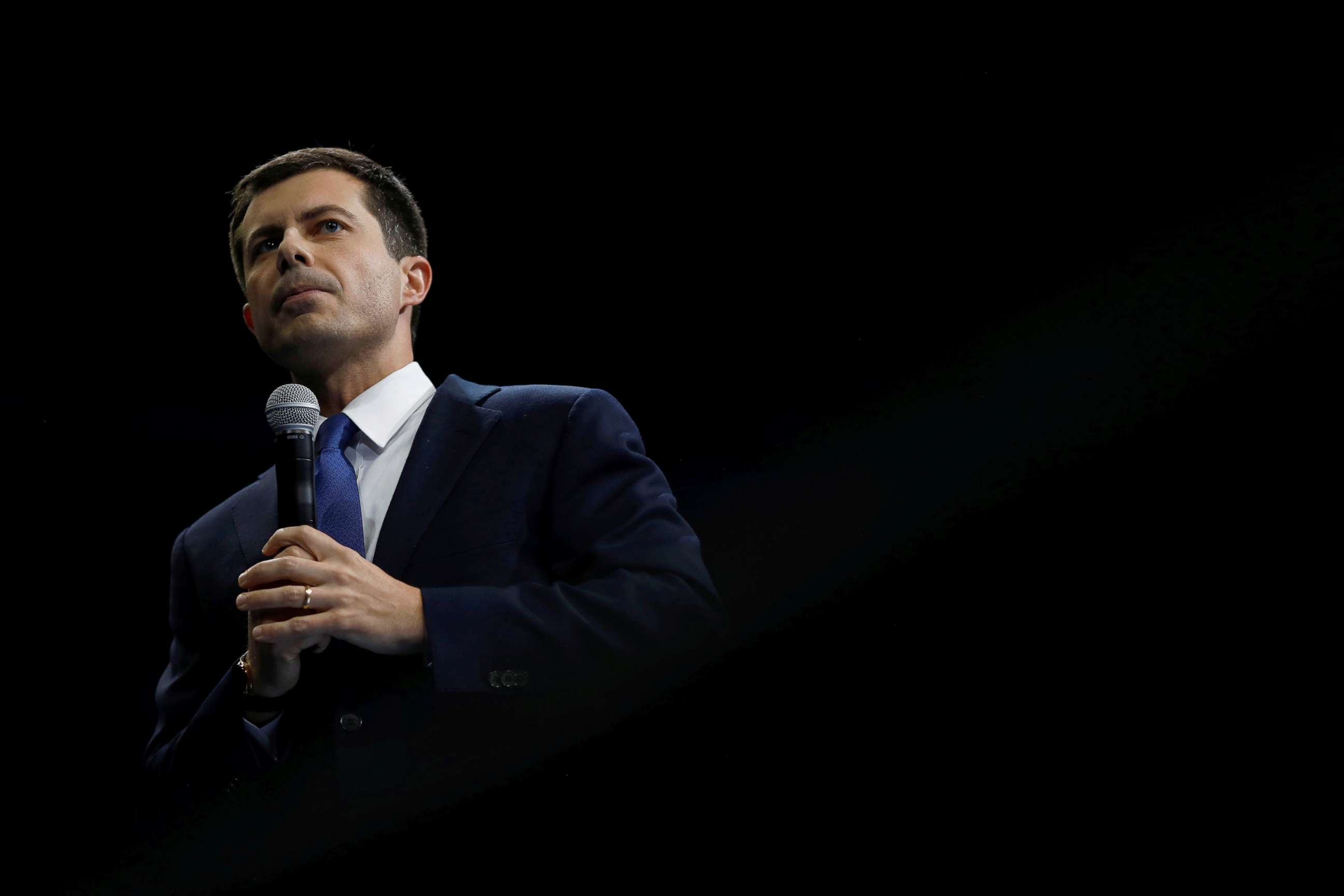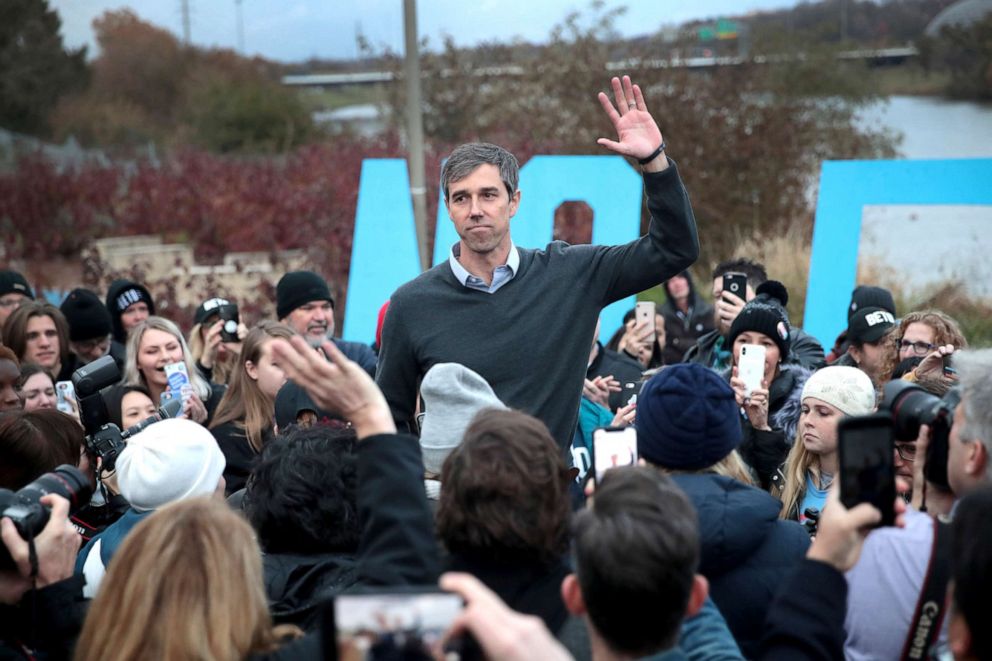The Note: Mayor Pete earns another moment in campaign spotlight
Mayor Pete earns another moment in campaign spotlight.
The TAKE with Rick Klein
The stability at the top of what remains a fluid Democratic race is being threatened, not by a senator or governor, but by a mayor.
Mayor Pete Buttigieg has had moments before. He went to Iowa over the weekend intent on creating a new one for himself, in a location that famously worked for Barack Obama 12 years earlier.
Now he’s primed to get another good, hard look. A new ABC News/Washington Post poll has Buttigieg in solid position behind the top three candidates; he’s at 7%, with no one else even above 2%.

A New York Times/Siena College poll has him in what’s close to a virtual four-way tie in Iowa. And the thunder sticks and color-coordinated T-shirts at Friday’s Liberty and Justice Dinner -- along with a soggy outdoor concert in downtown Des Moines -- speak to the organization he’s starting to put together among potential caucus-goers.
Buttigieg is crafting a message built on biography.
"We can deliver major, meaningful, bold change to move this country forward in a way that galvanizes an American majority instead of polarizing our country further," Buttigieg told George Stephanopoulos Sunday on ABC’s "This Week."
Buttigieg raised some eyebrows with his suggestion that "this is getting to be a two-way" race between himself and Sen. Elizabeth Warren. He walked that back a half step on Sunday, praising the "most diverse field I think ever."
The exit of former Rep. Beto O’Rourke leaves one fewer younger, white man from a red state in the race. But Buttigieg now occupies a space in the race where he will be a target himself -- the flipside of the additional notice he’s drawing.
The RUNDOWN with MaryAlice Parks
Sen. Bernie Sanders said Saturday that he had a "better way" than Warren to raise revenue to pay for a Medicare for All-style universal health care system in the country. Comparing his ideas to Warren, Sanders said his proposal was "more progressive," drawing another line in the sand between he and his fellow senator.
Sanders has said he will raise taxes in order to build out his vision of a government health insurance system that automatically provides free health insurance to all Americans.
"The overwhelming majority of the American people, they would save and save substantially on their health care bills," he reiterated over the weekend. On Sunday, he said at an event in Waterloo that a person making $60,000 will pay about $100 per month for "comprehensive" coverage.
Warren instead promises not to directly individual taxes on middle income Americans. The bulk of her plan asks employers to pay taxes to the federal government in lieu of the cost-sharing premiums they already pay to private insurance companies to provide employees insurance.
Sanders zeroed in on that component in his critique.
"I think that that would probably have a very negative impact on creating those jobs, or providing wages, increased wages, and benefits for those workers," Sanders told ABC News. "So I think we have a better way, which is a 7.5% payroll tax, which is far more, I think, progressive, because it’ll not impact employers of low-wage workers, but hit significantly employers of upper-income people."
Warren, of course, rebutted: "All I can say is that employers will pay the same as they’re paying currently under Obamacare."
Warren also assumes state and local governments would be able to redirect a significant amount of their health care spending to her federally run, single-payer system. While Sanders and Warren say they share a same goal, the idea of how to pay for it draws new contrasts.
The TIP with Jeffrey Cook
He kicked off his presidential campaign in March raking in a staggering $6 million on the first day and polling as high as 10% nationally, but by Halloween, O'Rourke decided that his presidential campaign -- one that shook the national conversation on gun control while failing to sustain any of that momentum from the spring -- would come to an end.

At an emotional farewell event in Des Moines, Iowa, on Friday -- without endorsing any one candidate -- he encouraged his supporters to rally behind whoever becomes the Democratic nominee.
The former Texas congressman said he would not run for U.S. Senate in 2020, so the full impact of his withdrawal is unclear, but his call for the removal of every civilian assault rifle in the country, which Sen. Kamala Harris joined, pulled the gun violence conversation dramatically to the left.
O'Rourke is popular among Democrats in his home state, so fellow Texan, former Housing and Urban Development Secretary Julian Castro, was asked by reporters on Saturday if O'Rourke's decision would spark a shift in his strategy towards the delegate-heavy Super Tuesday state. Without tying it directly to O'Rourke's withdrawal, Castro said he "will start focusing on Texas, because we've been waiting to do that since it comes after these first four states. But we will focus on Texas, of course."
ONE MORE THING
Four White House officials slated for closed-door depositions Monday are not expected to show up on Capitol Hill despite the threat of subpoena from the committees leading the growing impeachment inquiry into President Donald Trump related to Ukraine, multiple senior-level sources told ABC News. Democrats had hoped to hear from four current White House officials: John Eisenberg, deputy counsel to the president for National Security Affairs; Michael Ellis, senior associate counsel to the president; Robert Blair, a top aide to the chief of staff; and Brian McCormack, an official with the office of management and budget.
THE PLAYLIST
ABC News' "Start Here" Podcast. Monday morning’s episode features ABC News Political Director Rick Klein, who tells us where the presidential race stands one year out and how candidates are reacting to Elizabeth Warren’s new Medicare for All plan. Then, ABC News’ Kyra Phillips tees up another big week of depositions in the ongoing impeachment inquiry. http://apple.co/2HPocUL
WHAT YOU NEED TO KNOW TODAY
Download the ABC News app and select "The Note" as an item of interest to receive the day's sharpest political analysis.
The Note is a daily ABC News feature that highlights the key political moments of the day ahead. Please check back tomorrow for the latest.




